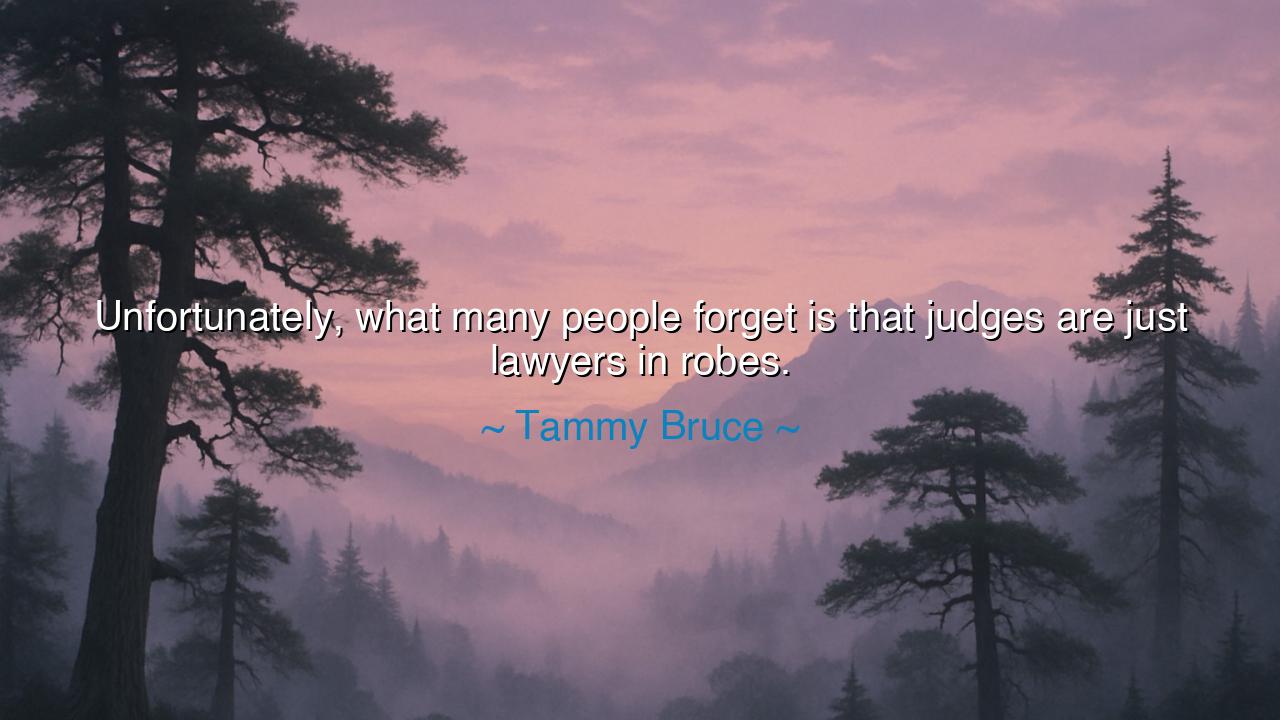
Unfortunately, what many people forget is that judges are just






Hear, O listeners, the piercing words of Tammy Bruce, who declared: “Unfortunately, what many people forget is that judges are just lawyers in robes.” At first glance, this utterance may seem irreverent, even dismissive, of those who sit upon the bench. Yet beneath its sharpness lies a profound truth: that those we elevate to robes and titles are not divine beings, but men and women—fallible, limited, and shaped by the same biases and frailties that color all human life.
The meaning of this saying is rooted in humility and caution. The image of a judge often conjures majesty—an impartial oracle, a guardian of justice whose words carry the weight of fate. Yet Bruce reminds us that every judge begins as a lawyer, trained in advocacy, accustomed to argument, and touched by the same ambitions and shortcomings as any in the legal profession. The robe does not transform the essence of the person; it merely clothes them with authority. The danger comes when society forgets this, mistaking power for perfection.
The ancients also taught this wisdom. In Rome, when consuls or generals paraded in triumph, a slave would whisper in their ear: “Remember, you are mortal.” This reminder served the same purpose as Bruce’s words: to guard against the illusion that power elevates one above humanity. To believe that judges are beyond human weakness is to give them unchecked authority. But to remember they are “just lawyers in robes” is to hold them accountable, to see them as stewards, not gods.
Consider the story of the Dred Scott decision in 1857, when the Supreme Court declared that African Americans could not be citizens of the United States. The judges who delivered this verdict were men trained in law, but blinded by the prejudices of their age. The robe did not cleanse them of bias; it merely amplified their errors into national tragedy. Their ruling fanned the flames of division and hastened the nation toward civil war. Here, history reveals Bruce’s warning: never forget that the robe cannot transform a lawyer’s heart into perfect justice.
And yet, there is hope in this reminder as well. For if judges are merely lawyers in robes, then they are not beyond question. They can be challenged, corrected, and reformed. Their rulings can be overturned, their reasoning scrutinized, their power checked by the people and by the laws themselves. This truth calls us not to despair, but to vigilance, for the health of justice depends not on blind reverence but on constant accountability.
The lesson, then, is clear: honor the courts, but never idolize them. Respect the office of the judge, but do not forget the humanity of the one who wears the robe. Demand integrity, transparency, and fairness, for these virtues do not flow automatically from position—they must be chosen daily by those entrusted with authority. And when they fail, as all humans sometimes do, let the people and the law rise to correct them.
Therefore, O listener, take this wisdom into your life: in every sphere of authority—whether in government, in religion, or in community—remember the humanity of those in power. Do not be dazzled by titles or robes, but measure leaders by their actions, their fairness, and their humility. Speak truth to them when they err, and support them when they act rightly. For in this balance lies the strength of a just society.
So let Bruce’s words endure as both warning and guidance: “Judges are just lawyers in robes.” They are human beings, fallible yet capable of greatness. Let us remember their humanity, so that we may demand justice with eyes open, not blinded by illusion. For true justice arises not from robes alone, but from courage, accountability, and the unyielding pursuit of what is right.






AAdministratorAdministrator
Welcome, honored guests. Please leave a comment, we will respond soon